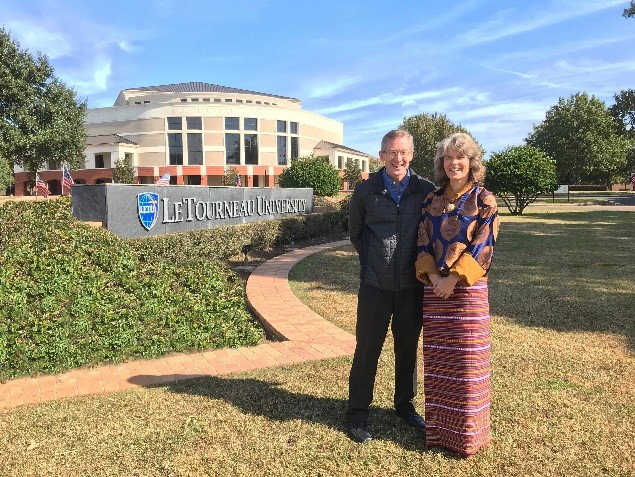
Immediately after arriving in Bhutan for a 10-month teaching assignment, Brent and Kathy Baas watched as most of their luggage was loaded onto the roof of a public transport bus to take it about 300 miles across the country.
“I thought it was the last time I would ever see our suitcases,” Brent said. “I took a cell phone picture of them being loaded up, in case I ever needed it later.”
The car that had come to take them to the remote region of Bhutan where Brent would be teaching was so small it would only accommodate themselves and their driver.
But they shouldn’t have worried. When they arrived at their apartment, their luggage was already there.
Taking a sabbatical from LeTourneau University allowed Brent and Kathy to live in Bhutan for the past year where Brent taught technology classes at a college under a Fulbright teaching scholarship.
“It was a great opportunity to be a cultural ambassador,” Brent said. “You come and share who you are with the people there.” Brent said he was free to talk about his Christian faith in this country where about three-fourths of the country is Buddhist, while a quarter practices Hinduism. Yet, seeds of Christian faith may still have been planted.
Bhutan is a small, mountainous country nestled in the foothills of the Himalayas, landlocked with China on the north and India on the south. Along the mountainous roads are Buddhist monasteries and temples surrounded by green, lush, vegetation with glacier-fed waterfalls flowing down alongside the mountains. Roads, cut through the sides of the mountains, have no guard rails and are known for landslides that can send boulders down large enough to knock a car off the steep cliffs. Most all travelers pray for safety, Brent said.
Rich in cultural tradition and strongly established in Vajrayana Buddhism, Bhutan has one of the lowest population densities in the world, with a total population of about 750,000, yet it is bordered by some of the most heavily populated countries in the world. Strongly dependent on unity and conformity for its survival between its neighboring giants, Bhutan is a country that measures its success not on gross domestic product but by “Gross National Happiness.”
One of the least developed countries in the world, Bhutan is also the only carbon negative country in the world. A constitutional monarchy led by the head of state, the beloved and popular king of Bhutan, known as the “Dragon King,” the government provides free medical care and education to its citizens.
Colorful “prayer flags” wave in the wind across bridges, placed by individuals who want their worries to be carried off in the wind. Rams, like dogs, sat at the front door of their apartment. Monkeys played in the garden.
Brent said Bhutan is a country where simplicity is valued, hot chilis are the key ingredient of most meals, and the people are gentle, gracious, and reserved, yet they also are welcoming of foreign visitors.
“We started a traditional teatime at our house,” Kathy said. “And as we opened our house, they opened theirs. We appreciated the relationships God blessed us with. We had a small Indian group and a Bhutanese group that drew us in. We grew to love and appreciate these people. They were like family.”
They formed a group of friends to go trekking up to the top of the mountains for picnics.
“We even took hikes in the rain,” she said. “They know how to picnic, bringing dishes and having a full meal, not just a granola bar.”
Bhutan is ushering in the age of technology and adjusting in a short time frame to advances that the Western world has had decades to adapt to, Brent said. Being the last country in the world to introduce television, which has been available there only since 1999, Bhutan faces great opportunities and challenges as it opens itself to the world. Since television was introduced, their Gross National Happiness index began dropping.
The college where Brent taught was former high school boarding school that had been renovated to become a college. Many of the students would have preferred to go to a more prestigious school, he said, but their national exams (equivalent to SAT scores here) were not as high.
Students there are required to wear the national dress which includes the “Gho” for men, a long robe held in place with a woven cloth belt that forms a pocket in front, and a “Kira” for women, a long, woven and unstitched fabric used to make a skirt to the ankle with a wonju (long-sleeved blouse) under a tego (jacket) with sleeves folded back to form wide cuffs. Tradition is respected.
The Bhutanese are not very competitive, except for team sports like soccer, Brent said. He brought an American football and filmed the Bhutanese playing with it in a game that looked more like rugby. He said he found motivation to be a challenge with his students until he introduced them to the Internet of Things and doing programming competitions in their classroom computer lab.
He said the internet and YouTube are popular there today, as is karaoke singing.
Kathy described going to the center of the village after 6 a.m. to find where farmers would bring their organic produce and sell their wares. She bought mostly vegetables, finding milk offered in reused Pepsi cola bottles and butter sold wrapped in banana leaves. Because the Buddhists have such respect for life, there are no slaughterhouses. Animals sold in the markets have died of natural causes, which led Brent and Kathy to become vegetarians during their stay in Bhutan.
“I saw God’s hand of blessing,” Kathy said. “It wasn’t easy or fun, but it was rich and deep.”